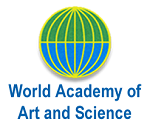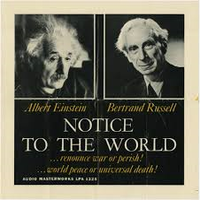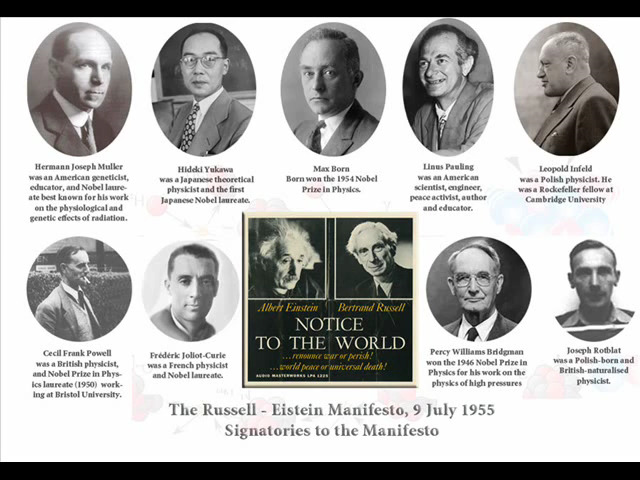Web-conference on The Relevance of the Russell-Einstein Manifesto

 Web-conference on The Relevance of the Russell-Einstein Manifesto
Web-conference on The Relevance of the Russell-Einstein Manifesto
A joint initiative of
World Academy of Art and Science & Nizami Ganjavi International Center
Click here to view Spanish version of Manifiesto Russell-Einstein
“We appeal as human beings to human beings:
Remember your humanity, and forget the rest.”
These are the moving words with which Albert Einstein, Bertrand Russell and nine other distinguished Nobel Laureate scientists introduced the famous resolution which became known as the Russell-Einstein Manifesto on July 9, 1955.
Exactly 65 years later, their message is as relevant today as it was when it was issued. The scourge of weapons of mass destruction and war still threaten us; but the crises confronting humanity have multiplied exponentially in number, intensity, complexity and impact on human security. Infectious diseases, hunger and poverty, unemployment and inequality, financial instability and economic uncertainty, the retreat from democracy, the reversion to competitive nationalism, and the overarching threat of climate change loom larger than ever. They are magnified by the vacuum in global leadership and a loss of trust and confidence in national and international institutions.
The sense of urgency, appeal to human conscience and universal values that reverberate through their Manifesto powerfully echo the needs of our time. The challenges we confront may be greater, but so too are our collective knowledge and capacity for effective global response. The voice of science, the aspirations of youth, the just demand for human rights, the sanity of human wisdom and the resourcefulness of human creativity compel us to call with renewed resolve for unprecedented steps to replace the failed doctrines and policies that have brought the world to its present state.
The Russell-Einstein Manifesto led directly to the establishment of Pugwash Conferences in 1957 and the founding of the World Academy of Art and Science in 1960. It has also inspired the work of a great many institutions dedicated to a better common future for all.
In view of the great relevance of the Manifest to the world today, we invite all like-minded organizations to reflect on the relevance of the Manifesto to the world today and seize the opportunity to convert the looming global threats confronting humanity into a compelling force for collective action. We call on nations, organizations and individuals everywhere in all fields to forge an inclusive alliance and movement for global peace and human security. Please join us and spread the word.
The Russell-Einstein Manifesto (9 July 1955)In the tragic situation which confronts humanity, we feel that scientists should assemble in conference to appraise the perils that have arisen as a result of the development of weapons of mass destruction, and to discuss a resolution in the spirit of the appended draft. We are speaking on this occasion, not as members of this or that nation, continent, or creed, but as human beings, members of the species Man, whose continued existence is in doubt. The world is full of conflicts; and, overshadowing all minor conflicts, the titanic struggle between Communism and anti-Communism. Almost everybody who is politically conscious has strong feelings about one or more of these issues; but we want you, if you can, to set aside such feelings and consider yourselves only as members of a biological species which has had a remarkable history, and whose disappearance none of us can desire. We shall try to say no single word which should appeal to one group rather than to another. All, equally, are in peril, and, if the peril is understood, there is hope that they may collectively avert it. We have to learn to think in a new way. We have to learn to ask ourselves, not what steps can be taken to give military victory to whatever group we prefer, for there no longer are such steps; the question we have to ask ourselves is: what steps can be taken to prevent a military contest of which the issue must be disastrous to all parties? The general public, and even many men in positions of authority, have not realized what would be involved in a war with nuclear bombs. The general public still thinks in terms of the obliteration of cities. It is understood that the new bombs are more powerful than the old, and that, while one A-bomb could obliterate Hiroshima, one H-bomb could obliterate the largest cities, such as London, New York, and Moscow. No doubt in an H-bomb war great cities would be obliterated. But this is one of the minor disasters that would have to be faced. If everybody in London, New York, and Moscow were exterminated, the world might, in the course of a few centuries, recover from the blow. But we now know, especially since the Bikini test, that nuclear bombs can gradually spread destruction over a very much wider area than had been supposed. It is stated on very good authority that a bomb can now be manufactured which will be 2,500 times as powerful as that which destroyed Hiroshima. Such a bomb, if exploded near the ground or under water, sends radio-active particles into the upper air. They sink gradually and reach the surface of the earth in the form of a deadly dust or rain. It was this dust which infected the Japanese fishermen and their catch of fish. No one knows how widely such lethal radio-active particles might be diffused, but the best authorities are unanimous in saying that a war with H-bombs might possibly put an end to the human race. It is feared that if many H-bombs are used there will be universal death, sudden only for a minority, but for the majority a slow torture of disease and disintegration. Many warnings have been uttered by eminent men of science and by authorities in military strategy. None of them will say that the worst results are certain. What they do say is that these results are possible, and no one can be sure that they will not be realized. We have not yet found that the views of experts on this question depend in any degree upon their politics or prejudices. They depend only, so far as our researches have revealed, upon the extent of the particular expert’s knowledge. We have found that the men who know most are the most gloomy. Here, then, is the problem which we present to you, stark and dreadful and inescapable: Shall we put an end to the human race; or shall mankind renounce war? People will not face this alternative because it is so difficult to abolish war. The abolition of war will demand distasteful limitations of national sovereignty. But what perhaps impedes understanding of the situation more than anything else is that the term “mankind” feels vague and abstract. People scarcely realize in imagination that the danger is to themselves and their children and their grandchildren, and not only to a dimly apprehended humanity. They can scarcely bring themselves to grasp that they, individually, and those whom they love are in imminent danger of perishing agonizingly. And so they hope that perhaps war may be allowed to continue provided modern weapons are prohibited. This hope is illusory. Whatever agreements not to use H-bombs had been reached in time of peace, they would no longer be considered binding in time of war, and both sides would set to work to manufacture H-bombs as soon as war broke out, for, if one side manufactured the bombs and the other did not, the side that manufactured them would inevitably be victorious. Although an agreement to renounce nuclear weapons as part of a general reduction of armaments would not afford an ultimate solution, it would serve certain important purposes. First, any agreement between East and West is to the good in so far as it tends to diminish tension. Second, the abolition of thermo-nuclear weapons, if each side believed that the other had carried it out sincerely, would lessen the fear of a sudden attack in the style of Pearl Harbour, which at present keeps both sides in a state of nervous apprehension. We should, therefore, welcome such an agreement though only as a first step. Most of us are not neutral in feeling, but, as human beings, we have to remember that, if the issues between East and West are to be decided in any manner that can give any possible satisfaction to anybody, whether Communist or anti-Communist, whether Asian or European or American, whether White or Black, then these issues must not be decided by war. We should wish this to be understood, both in the East and in the West. There lies before us, if we choose, continual progress in happiness, knowledge, and wisdom. Shall we, instead, choose death, because we cannot forget our quarrels? We appeal as human beings to human beings: Remember your humanity, and forget the rest. If you can do so, the way lies open to a new Paradise; if you cannot, there lies before you the risk of universal death.
|
Other Links:
- Remember your humanity: Anniversaries of the Russell-Einstein Manifesto, ICJ case and Rainbow Warrior bombing Click here for more details
- Russell-Einstein Manifesto: 65 years later- July 9, 2020 by Canadian Pugwash Group

 Web-conference on The Relevance of the Russell-Einstein Manifesto
Web-conference on The Relevance of the Russell-Einstein Manifesto
A joint initiative of
World Academy of Art and Science & Nizami Ganjavi International Center
Program on 13 July, 2020
1st Panel (Session Complete) – Video Link
11 AM – Central European Summer Time (CEST) (UTC+2)
12 PM – Eastern European Summer Time (EEST) (UTC+3)
12 PM – Israel Daylight Time (UTC+3)
1 PM – Azerbaijan Standard Time (AZT) (UTC+4)
Moderator: Garry Jacobs, President and Chief Executive Officer, World Academy of Art & Science (WAAS)
- Abdulaziz Altwaijri, former Director General of ISESCO
- Hikmet Cetin, Minister of Foreign Affairs of Turkey 1991-1994; Deputy Prime Minister of Turkey 1995; WAAS Fellow
- Mila Popovich, Founder of EVOLving Leadership; WAAS Fellow
- David Chikvaidze, Chef de Cabinet of the Director-General of UNOG at Geneva; WAAS Fellow
- Mladen Ivanic, Chairman of the Presidency of Bosnia and Herzegovina 20016-17; 2014-15
- Amre Moussa, Secretary General, Arab League 2001-2011, Minister of Foreign Affairs of Egypt 1991-2001
- Bujar Nishani, President of Albania 2012-2017
- Alyn Ware, Coordinator of Parliamentarians for Nuclear Non-proliferation and Disarmament (PNND); Member, World Future Council; WAAS Fellow
2nd Panel (Session Complete) – Video Link
10 AM – Eastern Daylight Time (EDT) (UTC-4) 3
4 PM – Central European Summer Time (CEST) (UTC+2)
5 PM – Eastern European Summer Time (EEST) (UTC+3)
6 PM – Azerbaijan Standard Time (AZT) (UTC+4)
Moderator: Ismail Serageldin, Vice President, World Bank 1992-2000; Co-Chair, NGIC; WAAS Fellow
- Emil Constantinescu, President of Romania 1996-2000; WAAS Fellow (video)
- Maria Espinosa, President, 73rd UN General Assembly, Ecuador; Member, World Future Council
- Jonathan Granoff, President, Global Security Institute; WAAS Fellow
- David Harries, FormerChair, Canadian Pugwash Group,Principal Investigator, S&S Guide; WAAS Fellow
- Garry Jacobs, President and Chief Executive Officer, World Academy of Art & Science (WAAS)
- Donato Kiniger-Passigli, Vice President of WAAS; Adviser to UNITAR
- Zlatko Lagumdzija, Prime Minister of Bosnia and Herzegovina 2001-2002; Deputy Prime Minister, Minister of Foreign Affairs 2012-2015; WAAS Fellow
- Edward N. Luttwak, Senior Associate, Center for Strategic and International Studies of Washington DC., Chairman of AP Fleet, (aircraft leasing), Dublin, Ireland
- Mila Popovich, Founder, EVOLving Leadership; WAAS Fellow
- Kateryna Yushchenko, First Lady of Ukraine 2005-2010; Head of the Supervisory Board, The Ukraine 3000 International Charitable Foundation
- Nathalie Goulet, Member of French Senate
- Sarai Nuñez-Ceron, Federal Congress Member
Description of the Panels
The Russell-Einstein Manifesto warned of the existential threat posed by nuclear weapons to the citizens of the world. It did not lead to the eradication of nuclear weapons, but it succeeded in generating widespread awareness of the catastrophic dangers of nuclear war, paving the way for the founding of Pugwash Conferences and World Academy of Art & Science, the birth and growth of the nuclear abolition movement, the first treaties banning atmospheric testing, the Nuclear Non-Proliferation Agreement, numerous arms control agreements, and eventually to the elimination of tens of thousands of nuclear warheads and measures to reduce the danger of accidental usage.
The objective of the panels is to address the global leadership vacuum by identifying catalytic, collaborative, multistakeholder, multisectoral strategies to promote effective action on the pressing political, economic, social, technological and ecological challenges confronting humanity today. The panels will examine three questions:
- What can be done to educate public opinion and generate political support for multilateral collaboration at the level of nation states?
- What can be done to enhance the effectiveness of international organizations?
- What can be done to strengthen collaboration and build alliances between scientific, education, youth and other civil society organizations to play a more influential and effective role as representatives of the shared values and common goals of all humanity?

